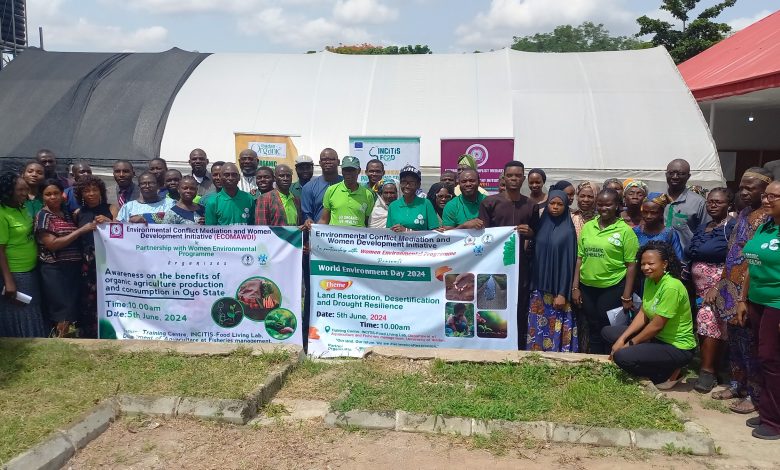CIVIL SOCIETY ORGANISATIONS URGE NIGERIANS TO EMBRACE USE OF ORGANIC PRODUCTS FOR HEALTHY LIVING

The participants at the end of a – one day workshop on organic farming jointly advocated the use and consumption of organic products because of the health benefits to human beings.
According to them, consumption of organic products will increase the life span of human beings because organic farming are devoid of chemicals input right from the planting to maturity.
Earlier, in her welcome address to the participants,
the Executive Director, Environmental Conflict Mediation and Women Development Initiative, Mrs Ijeoma Ladele acknowledged their partner organisation Women Environmental Programme, and sponsors the Women Engage for a Common Future for their support in carrying out this activity in the South West, She said
the day’s event marked the flag off of the awareness on the benefits of organic agriculture production and consumption, which aimed to create / strengthen access to organic market.
According to her
the day also marked the celebration of World Environment Day as we unite under the pivotal theme on “LAND RESTORATION, DESERTIFICATION, AND DROUGHT RESILIENCE.” She said as we come together, our collective mission is to raise the awareness and inspire action towards a healthier, and more sustainable planet.
Mrs Ladele noted that “land restoration is our call to revive the earth’s landscapes, ensuring that degraded lands are brought back to life. It is about replenishing our soils, forests, and wetlands, and creating a thriving habitat for all living creatures. By restoring our land, we are not only nurturing nature but also bolstering our food security and livelihoods.”
“Desertification and drought resilience are critical areas of focus as we face the escalating impacts of climate change. Desertification transforms fertile land into barren deserts, threatening ecosystems and communities. Droughts also intensified by climate shifts, lead to severe water shortages, impacting agriculture and human health.”
She declared that our efforts must prioritize innovative solutions to combat these challenges, promoting sustainable water management and agricultural practices adding that today, “we also shine a spotlight on organic production and consumption. Organic farming preserves the integrity of our soils and ecosystems, avoiding harmful chemicals and fostering biodiversity. Choosing organic products supports a healthier lifestyle and encourages sustainable agricultural practices.”
“By making informed choices, we can drive demand for organic goods, propelling a movement towards more responsible production and consumption.”
“As we embark on this journey, let us pledge to be stewards of the environment by empowering all genders in land restoration, combating desertification, build resilience and inclusive sustainable solution”, she continued. “Remember that each action we take, no matter how small, contributes to a larger wave of positive change. Let us champion organic practices for a sustainable future and a sustainable environment”, she pleaded.
The Director, University of Ibadan Health Services, Dr Aderonke Ajav, in her own contribution said University health services would continue to advocate the consumption of organic food, because of its immense health benefits, saying as a result of this, university health services had created few markets within the university environment where organic products can be purchased at the affordable prices.
Also speaking, Professor Adams Onuka, a technical adviser to the organisers of the event charged Nigerians
to cultivate organic Agriculture because it does not involve using chemicals for mass production .
Professor Onuka also said organic farming would help our environment and serve us better.
Also speaking at the technical section of the event, a programme officer, with Network of organic Agriculture Researchers, Mrs Oluwatoyin Ologundudu, on a topic titled
” ORGANIC AGRICULTURE: A CLIMATE SMART AGRICULTURE SYSTEM” listed some benefits of organic agriculture system to include
reducing the toxic load in the environment.
To keep chemicals out of the air, water, soil and our bodies.
To reduce if not eliminate farm pollutants, and protect future generations. It is also to build healthy soil, taste better and truer flavour and assist family farmers of all sizes to promote biodiversity culture and preservation. To help them access premium price, if their products are certified as organic.
Other benefits include,
recycling wastes of plant and animal origin in order to return nutrients to the land, thus minimising the use of non-renewable resources.
It is to reduce global warming by lowering emission of greenhouse gases hence temperature rise.
Organic farming enhances biological diversity within the whole system and increase soil biological activity. To minimise indiscriminate use of pesticides which adversely affects human and animal health, biodiversity of wildlife etc. & causes environmental pollution.
She said development of organic farming should be increased in Nigeria and other parts of the world because of its positive impact on climate change
Dr Oyediran Olusegun Oyebola
Principal Investigator, Integrated and Circular Technologies for Sustainable city region
FOOD systems in Africa (INCiTiS-FOOD), Department of Aquaculture and Fisheries Management, University of Ibadan,
Nigeria
spoke on topic:
“Modelling Organic and Soiless Circular Urban Food Production for Land Management, Biodiversity
Conservation, and Mitigation of Drought and Desertification; a Case of INCITIS-FOOD Innovation
Production and Consumption in Oyo State, He
listed some challenges farmers using organic farming system may encounter and these as follows:
Of the 75 percent of the land that is suitable for agriculture, only
40% is in current use while 1/4 persons, of sub-Saharan Africa, lack access to adequate food
Competitive land use for urbanization and rural
development
Soil-based rural/urban farming may not be sustainable
Food nutrient Loss in Rural-urban transportation
. Water scarcity and lack of sustainable quality
Soil nutrient loss and cost of organic fertilizers
Distance from the market in rural production
.Need for land-water use efficiency and the
Need for reduced cost of organic food in Nigeria.
Professor Ade Oluwa represented by Dr, Ayanfe Oluwa, In his own key note address that falls on world Environmental day , with the theme ” land the Effects of Urbanisation on Agricultural Land and Food Security, Desertification and drought resilience ” listed some benefits of organic agriculture to farmers, to health practitioners and environmental advocates,as well as consumers .
These include ” farmers should not give up but persistent and focus on the long term benefits to your soil and your consumers”.
“To health practitioners and environmental advocate, l encourage you to continue to advocate for Food consumption through sustainable agricultural production like organic farming”.
“To the consumers, l implore you to be more conscious of healthy foods consumption through organic produce and products”.
Dr Stephen Faleti of the Institute for peace and Strategic Studies , University of ibadan, in his own paper titled
“The Effects of Urbanisation on Agricultural Land and Food Security” stressed that
“Agricultural land availability is a critical factor in achieving food security. It is essential to protect and manage agricultural land sustainably to meet the growing demand for food.” Adding that “By addressing issues such as urbanization, climate change, and land degradation, we can ensure a secure and sustainable food supply for present and future generations.”




